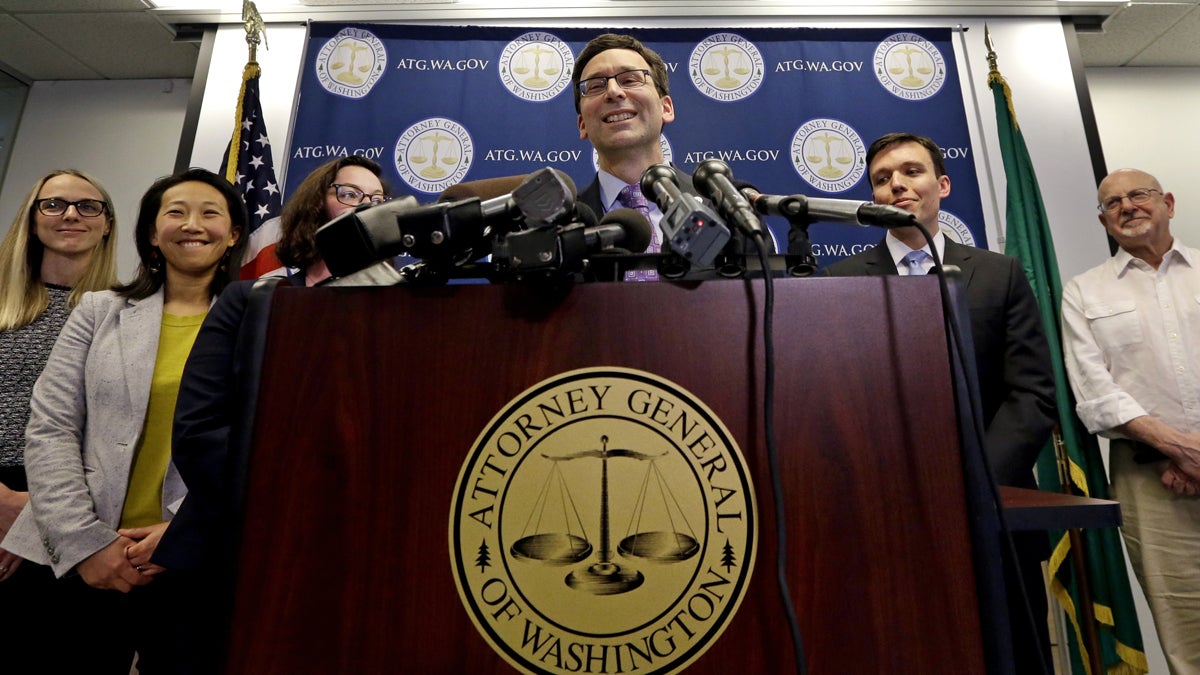Trump versus ‘the fundamental structure of our constitutional democracy’

Washington Attorney General Bob Ferguson speaks at a news conference about a federal appeals court's refusal to reinstate President Donald Trump's ban on travelers from seven predominantly Muslim nations
Three federal appeals court judges took Trump to the woodshed and whupped him bigly.
I’ve read yesterday’s ruling so that you don’t have to. The decision to keep the Muslim travel ban in limbo was unanimous and bipartisan; two Democratic appointees and a Republican appointee sided with the limbo ruling issued last Friday in federal district by a Republican appointee. That’s two losses for Trump in a week. One key quote in the new document appears on page 26:
“Despite the district court’s and our own repeated invitations to explain the urgent need for the Executive Order to be placed immediately into effect, the Government submitted no evidence … The Government has pointed to no evidence that any alien from any of the countries named in the Order has perpetrated a terrorist attack in the United States. Rather than present evidence to explain the need for the Executive Order, the Government has taken the position that we must not review its decision at all. We disagree.”
That’s precisely what Trump’s lawyers contended; in their view, Trump has “unreviewable authority” to do what he wants with immigrants as long as he cites national security. But the judges killed that con on page 14:
“There is no precedent to support this claimed unreviewability, which runs contrary to the fundamental structure of our constitutional democracy…Within our system, it is the role of the judiciary to interpret the law.”
Trump wouldn’t know about such things; lest we forget, this is a hustler who has spent most of his life making shady business deals and ogling beauty queens. If he had any capacity for humility, he’d read those passages and realize that he cannot rule by whim like his pal in Moscow.
No, the ruling won’t make him any wiser — his gut response was to tweet in capital letters, “SEE YOU IN COURT” (presumably, the Supreme Court) — and he will behave as if he has lost nothing. Indeed, the appeals judges merely decided that there’s no urgent reason to implement the travel ban now. This was just a preliminary skirmish in a battle that could drag on for months.
But still, this latest verdict reminds us that the judiciary is our last best institutional bulwark against Trump’s home-grown authoritarianism. This is doubly true given the reality of congressional Republican spinelessness.
To put it in the simplest terms — and remember, the high court could reverse this, with or without Neil Gorsuch — the appeals trio said that Trump’s ban violates the Fifth Amendment’s “due process of law” guarantee. If government tries to deprive individuals of “life, liberty or property,” the courts have long said that affected individuals should be given “notice and an opportunity to respond.” The people affected by Trump’s travel ban — many of them stranded overseas or summarily held in airports — got no notice or opportunity to respond.
Granted, the affected people aren’t U.S. citizens — but that’s irrelevant. The appeals judges, quoting a 2001 Supreme Court ruling, pointed out that the due process guarantee applies “to all ‘persons’ within the United States, including aliens [regardless of whether] their presence here is lawful, unlawful, temporary, or permanent.”
The appeals judges also ruled that Trump’s ban violates the Constitution’s Equal Protection Clause, which bars religious discrimination. Trump’s lawyers said the travel ban wasn’t aimed at Muslims per se, but the judges didn’t buy it. They put the order in context. They noted that candidate Trump had vowed to target Muslims (“evidence of numerous statements by the President about his intent to implement a ‘Muslim ban'”), and, indeed, they pointed out that judges often assess the constitutionality of a law or executive order by studying the “evidence of intent” reflected in the “statements by decisionmakers.”
In plain English, this means that Trump’s big mouth got him in trouble.
This early test of the strength of our institutions will shift now to the federal district court in Seattle, where James Robart – the Republican appointee who first halted the ban – will put the ban on trial and hear evidence on whether to keep it in limbo. There is still much to discuss. Yes, the courts have the right to review, and even reject, a president’s national security claims, but it’s embedded in federal law that a president does have wide latitude on immigrant policy. For instance:
“Whenever the President finds that the entry of any aliens or of any class of aliens into the United States would be detrimental to the interests of the United States, he may by proclamation, and for such period as he shall deem necessary, suspend the entry of all aliens or any class of aliens as immigrants or non-immigrants, or impose on the entry of aliens any restrictions he may deem to be appropriate.”
So the biggest issue, still to be determined on the merits, is whether Trump acted within those ample powers, or whether he abused those powers by signing an order that violated the Constitution – and arbitrarily targeted seven Muslim-majority countries with no history of U.S. terrorism, while exempting countries that do have such history (countries where he also has business interests).
We all know how Trump feels. Last night, he reflexively tweet-screamed: “THE SECURITY OF OUR NATION IS AT STAKE!” And his acolytes still adore his determination to fight the institutions. But in the words of legal analyst Benjamin Wittes, the courts will be compelled to weigh Trump’s power to sign travel bans against “the incompetent malevolence” of the ban in question.
—
Follow me on Twitter, @dickpolman1, and on Facebook.
WHYY is your source for fact-based, in-depth journalism and information. As a nonprofit organization, we rely on financial support from readers like you. Please give today.

